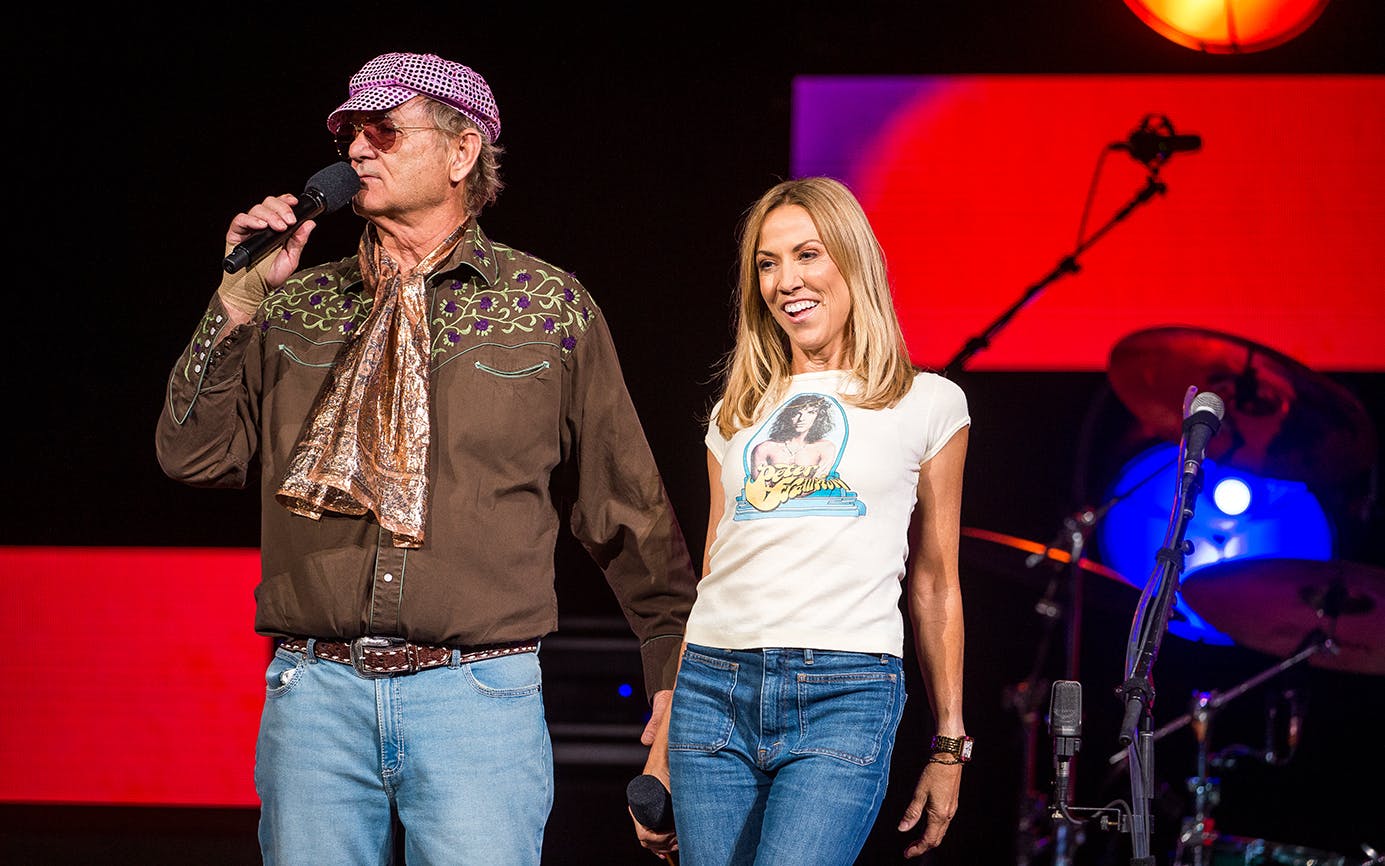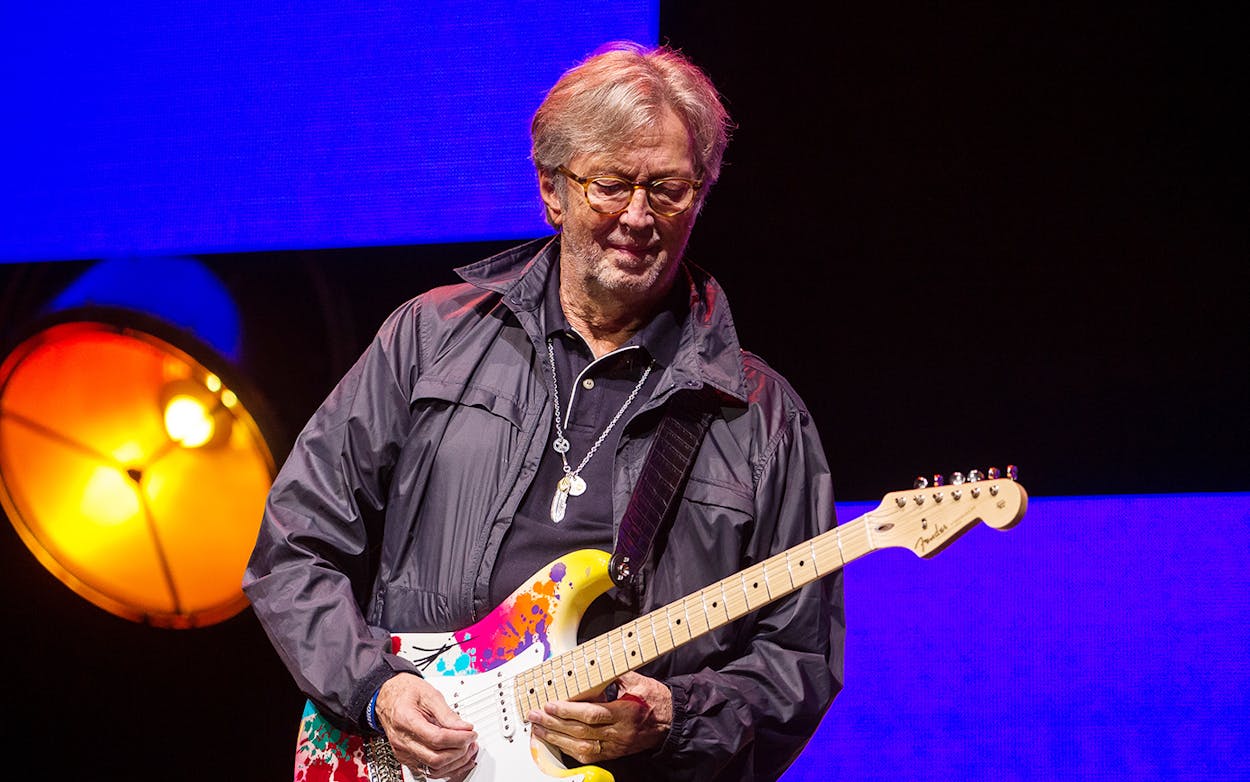The bill for Eric Clapton’s Crossroads Guitar Festival last weekend in Dallas seemed to have been drawn up from the results of a “dream duets” poll in an issue of Guitar Player magazine.
Austin’s Gary Clark Jr. joined Citizen Cope for an enthusiastic solo on Cope’s 2004 hit “Son’s Gonna Rise” and returned to pair with Doyle Bramhall II on the B.B. King standard “Rock Me Baby.” Bonnie Raitt appeared with Keb’ Mo’ on Bob Dylan’s “Million Miles,” then returned for two songs each with Jimmie Vaughan and Sheryl Crow. Vaughan also got some local help in the form of ZZ Top’s Billy Gibbons—the duo play occasionally as the Jungle Show in Austin, and Vaughan’s band capably leaned into renditions of “Sharp Dressed Man” and “La Grange.” Crow also brought British newcomer James Bay and Bramhall out for duets. Toward the evening’s end, Jeff Beck brought out a collaborator nobody was expecting, welcoming Johnny Depp to the stage for renditions of Link Wray’s “Rumble” and John Lennon’s “Isolation.”
When Clapton throws his sporadic two-night festival—this was just the fifth edition—his friends and fans come calling from near and far. Crossroads debuted fifteen years ago at the Cotton Bowl, so the spectacle at American Airlines Center marked a return to Texas. Clapton has shown a fondness for Dallas-Fort Worth over the years, rehearsing here ahead of tours, and Dallas is also the hometown of Clapton’s longtime friend Vaughan, who was an integral player in the event.
While the impressive roster of classic rockers was the main draw, in a savvy creative move, the lineup included smart genre wild cards. Opening performer Sonny Landreth brought a taste of Louisiana slide guitar to the proceedings and was given twenty minutes to let fly on the main stage. Accomplished Argentinian composer Gustavo Santaolalla played an intermission with his compositions from films The Book of Life and The Motorcycle Diaries. There was also a bit of rockabilly from the duo of Elvis Presley’s 1970s guitarist James Burton and country ace Albert Lee. To their credit, the audience remained attentive during these diversions, though they did grow a bit restless during an extended Brazilian jazz fusion set from Kurt Rosenwinkel and Pedro Martins. Overall, adding the unexpected made the marathon nature of the night more intriguing.
With the dual challenge of a deep roster of talent and each evening’s performances being shown on pay-per-view, the technical prowess of Clapton’s event team may have been the night’s biggest marvel. During Friday’s five-and-a-half-hour show, the combination of a circular rotating stage and two satellite acoustic mini-stages meant that there were only ten minutes or so of downtime the entire evening.
Bill Murray hosted the proceedings dressed as a classic rock-style roadie. While his patter was mostly fun and innocuous (he led a singalong of “Deep in the Heart of Texas” and joked about mistakenly advising the Beatles to break up), he also misfired with a leering, sexist introduction of Sheryl Crow that referenced her as “being known for unrivaled backstage sex” that drew a collective wince from the crowd. (In a later appearance onstage with Murray, Crow called the proceedings “so not a #metoo moment.”)

Night one of Crossroads found Clapton in a humble and deferential mood. On a bill with more than a dozen acts, Clapton opted to play second, performing in the “unplugged” format that won him an armful of Grammys in 1993. The half-hour set covered familiar territory (“Tears in Heaven” and “Lay Down Sally”) and blues standards (“Nobody Knows You When You’re Down and Out”). As his set wrapped before eight o’clock, one could only wonder at how bewildered latecomers might be to have missed him.
Fortunately, Clapton returned in the eleven o’clock hour to trade leads on Beatles classic “While My Guitar Gently Weeps” with Peter Frampton—which, of course, features an uncredited Clapton guitar solo on the White Album version. It initially looked like Frampton would take the famous solo, but Clapton swooped in to give the crowd the moment they’d been waiting for, albeit in restrained form. Frampton described the duet succinctly as he departed the stage: “You’ve all just watched a dream come true.” (The moment inspired Murray to rib the duo for choosing a Beatles cover: “That’s just cheap, ineffectual theatrics.”)
The festival benefits the Crossroads Centre, a facility Clapton founded in Antigua to help those in need of recovery from chemical dependence. All-star charity events can often come off as disjointed, because of large casts of characters and little rehearsal time. Crossroads seemed to be the rare such endeavor that respects its audience enough to deliver consistent quality of talent and production over an extended running time. (There’s a reason the previous four festivals have all seen DVD releases.)
Perhaps the brightest note, though, was the refusal merely to trade on nostalgia. The night’s best set was from the Marcus King Band, who were given a spot late in the evening when expectations were running high. It’s not easy to command a stage amid a galaxy of stars, but King and his band thrived in the moment, playing loud, fast, and with obvious stylistic nods to Otis Redding, the Allmans, and Janis Joplin. While King is well known in blues and jam circles, granting him the stage as a headliner offered the crowd a newly minted guitar hero to take home with them. That, one suspects, was precisely Clapton’s quiet intention.
- More About:
- Music






